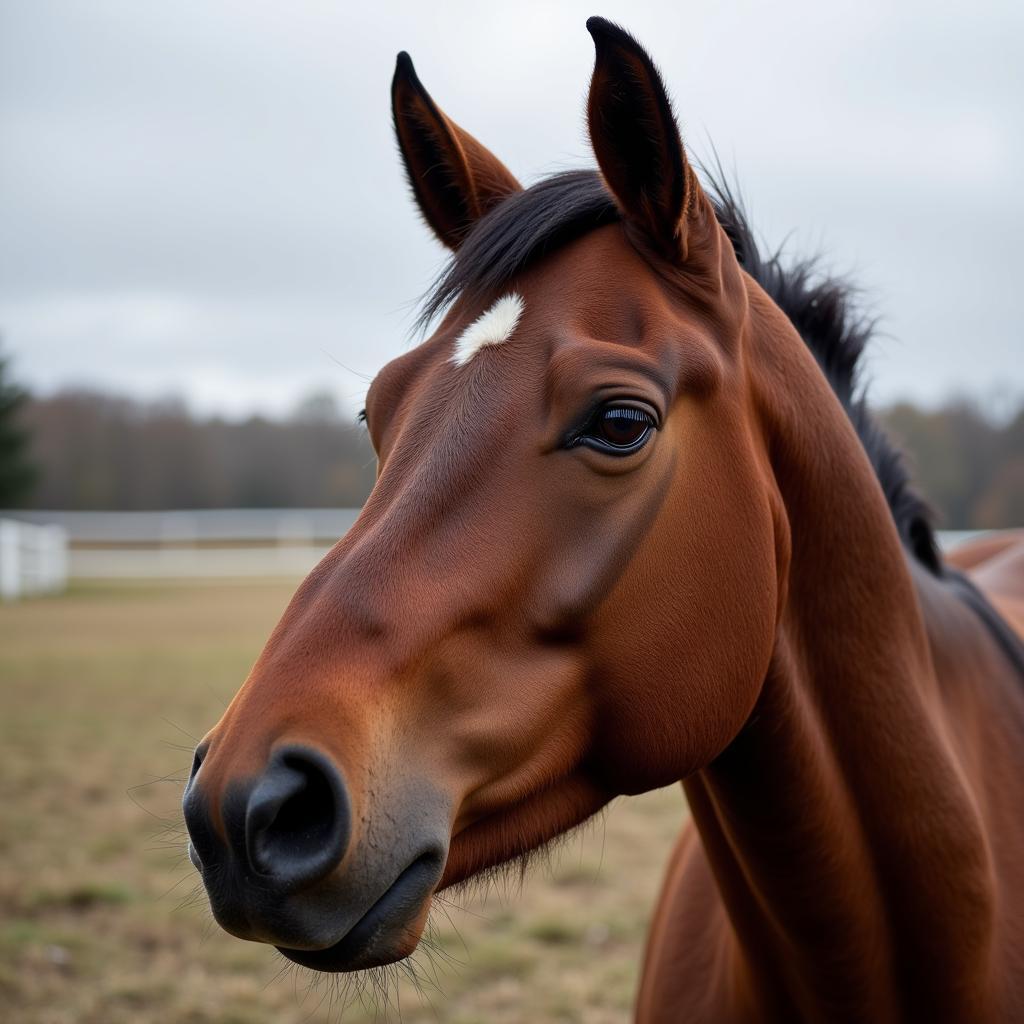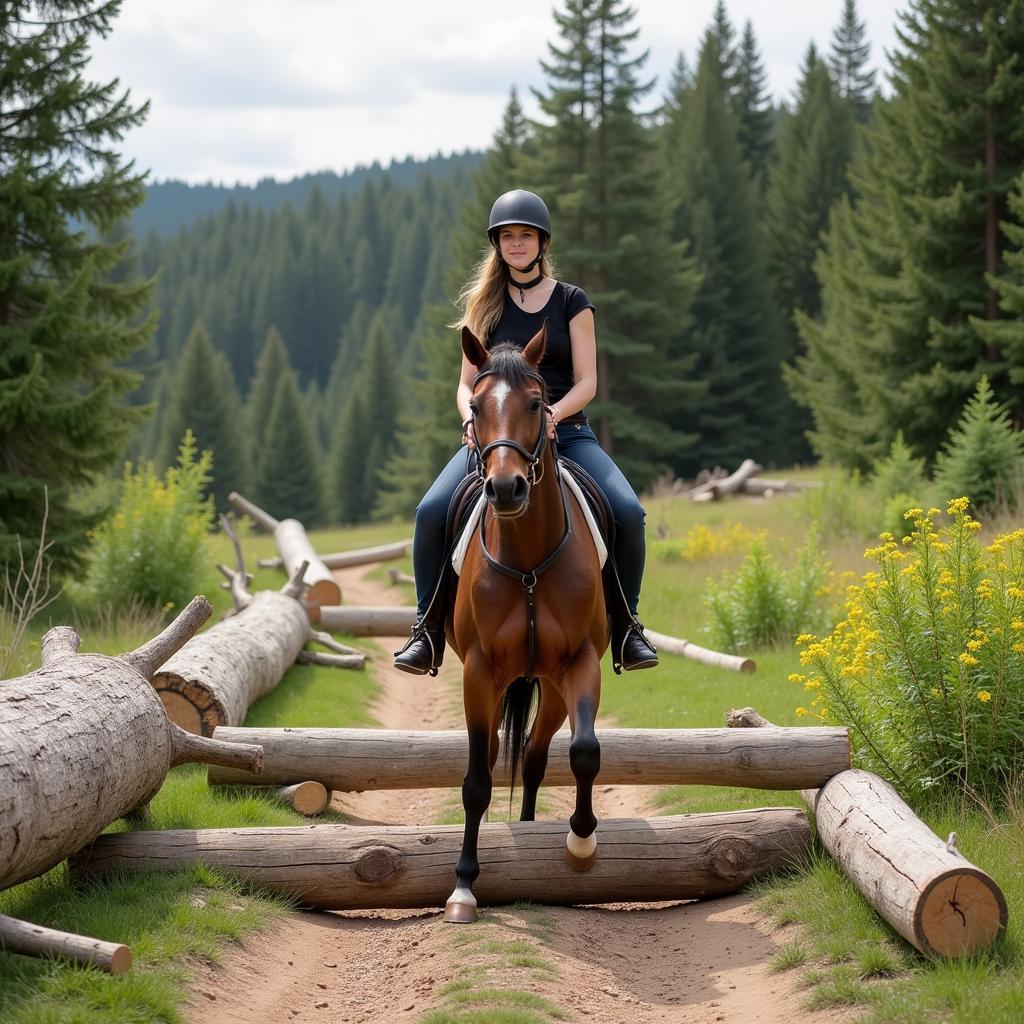Horses are prey animals with a strong instinct for self-preservation, leading them to react quickly to perceived threats. This natural response, while crucial for their survival in the wild, can manifest as spooking, a sudden and often dramatic reaction to something unexpected. Understanding the reasons behind why horses spook and learning how to manage these situations is crucial for the safety and well-being of both horse and rider.
Why Do Horses Spook?
Horses spook for a myriad of reasons, but it often boils down to their natural instincts and sensory perception, which differs significantly from ours. Here’s a deeper look:
- Unfamiliar Objects & Sounds: A flapping plastic bag, a rustling bush, or even a change in their usual environment can startle a horse. Their heightened senses pick up on subtle cues we might miss, triggering a fear response.
- Sudden Movements: Quick or unexpected movements, especially within their peripheral vision, can trigger a flight response. This is why approaching a horse calmly and predictably is essential.
- Poor Visibility: Horses have blind spots directly in front of and behind them. Objects suddenly appearing in these areas can cause them to shy or bolt. Additionally, low light conditions can amplify their natural fear of the unknown.
- Past Experiences: Horses are creatures of habit and have excellent memories. A negative experience associated with a specific object, location, or sound can trigger a fear response in similar situations.
- Temperament: Just like people, horses have individual personalities. Some are naturally more reactive or sensitive than others, making them prone to spooking.
Recognizing the Signs of a Spooked Horse
While a full-blown spook is hard to miss, recognizing the subtle signs of anxiety or fear can help you prevent a more dramatic reaction. Keep an eye out for:
- Head & Ear Movements: A horse that suddenly raises its head, pins its ears back, or starts swivelling its ears rapidly is showing signs of alertness and potential fear.
- Snorting & Blowing: Loud snorts, rapid breathing, and wide nostrils are all ways a horse expresses anxiety and warns others of potential danger.
- Muscle Tension: A tense body, raised tail, and a fixed stare are clear indicators that a horse is on high alert and preparing for a potential flight response.
 Horse with Ears Back
Horse with Ears Back
How to Handle a Spooked Horse
Staying calm and reacting appropriately is crucial when a horse spooks:
- Stay Calm & Balanced: Your horse will mirror your energy. Panic will only escalate the situation. Take deep breaths, keep your voice low and soothing, and maintain a secure seat.
- Don’t Punish: Scolding or punishing a spooked horse will only worsen its fear and create negative associations. Remember, it’s reacting instinctively, not being disobedient.
- Maintain Gentle Contact: Keep a light feel on the reins to provide reassurance and guidance but avoid harsh pulling or sawing on the mouth, which will further frighten the horse.
- Redirect & Reassure: If possible, calmly guide your horse away from the source of fear. Talk to it softly, stroke its neck, and allow it time to settle and regain composure.
Preventing Spooks: Building Confidence & Trust
Preventing spooking is an ongoing process of building your horse’s confidence and trust:
- Desensitization & Habituation: Gradually introduce your horse to potentially scary objects in a controlled environment. Allow it to investigate at its own pace and reward calm behavior.
- Groundwork & Training: Solid groundwork, including leading exercises, obstacle courses, and desensitizing training, can help build your horse’s confidence and teach it to trust your guidance.
- Riding in Different Environments: Expose your horse to a variety of sights, sounds, and experiences to expand its comfort zone and reduce its fear of the unknown.
- Know Your Horse: Every horse is different. Understanding your horse’s individual temperament, past experiences, and triggers will help you anticipate and manage potential spooking situations more effectively.
 Horse and Rider Navigating Trail Obstacles
Horse and Rider Navigating Trail Obstacles
Expert Insight
“Horses are masters of reading body language,” says renowned equine behaviorist Sarah Miller. “When a horse spooks, they are reflecting their environment and our energy. By staying calm, confident, and providing clear leadership, we can help them navigate those moments of fear and build a stronger bond based on trust.”
FAQ
1. Are some breeds more prone to spooking than others?
While any horse can spook, some breeds are known for being more sensitive or reactive. For example, Arabians are often praised for their intelligence but can also be more prone to spooking due to their heightened awareness.
2. Can a horse be “cured” of spooking?
Spooking is an instinctive behavior in horses. However, with proper training, desensitization, and building trust, you can significantly reduce the frequency and severity of spooking episodes.
3. What should I do if my horse spooks and I fall off?
If you fall off, try to land safely and move away from the horse. Once you’re safe, assess yourself for injuries and call for help if needed. It’s important to remount if possible or catch and secure your horse to prevent further incidents.
Looking for more?
Check out our articles on:
For any questions or concerns about your horse’s behavior, it’s always best to consult with a qualified veterinarian or equine behaviorist.
Remember, understanding why horses spook and building a strong foundation of trust are key to a safe and enjoyable partnership with these magnificent creatures.
Need help? Contact us at Phone Number: 0772127271, Email: [email protected] Or visit us at QGM2+WX2, Vị Trung, Vị Thuỷ, Hậu Giang, Vietnam. We have a 24/7 customer support team.